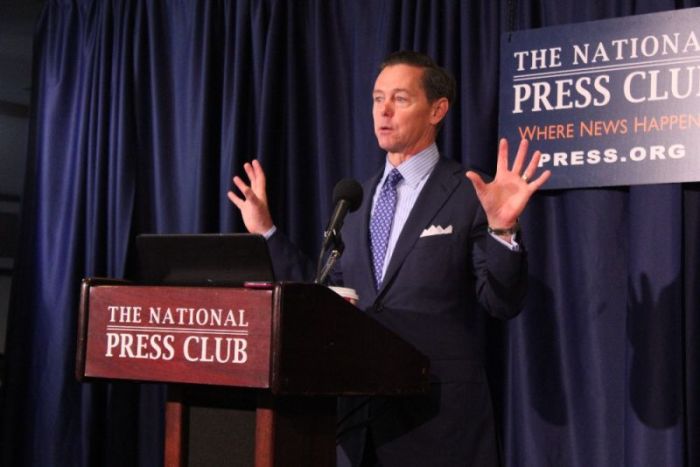White Evangelical Turnout Was Record-Setting in 2018 Midterm Election: Ralph Reed

WASHINGTON — Despite the Republicans losing control of the House of Representatives, white evangelicals and other conservaitve Christians turned out to vote in record capacity to help Republicans win in key gubernatorial and Senate races.
The national conservative evangelical grassroots organization Faith & Freedom Coalition, which knocked on over 2 million doors across 21 states in their voter turnout efforts this year, announced Wednesday that the 2018 election marked the "highest share of the electorate made up of conservative Christians in a mid-term election in the modern era."
Faith & Freedom Coalition President Ralph Reed, a longtime conservative activist who served as the executive director of the Christian Coalition during the 1990s, told reporters Wednesday morning that he is "pleased" with the result of the midterms as Republicans added to their majority in the Senate.
While it is true that the Republicans will no longer control the House and will give up control in a number of state legislatures, Reed stressed that increased white evangelical turnout in states like Florida, Georgia, Indiana and Missouri helped Republicans edge out their Democrat challengers in highly competitive races.
"We had an astonishing level of evangelical voters cast their ballots," Reed said at a press conference at the National Press Club. "This is the most ambitious and the most effective voter education, get-out-the-vote program directed at the faith-based vote in a midterm election in modern political history."
Faith & Freedom Coalition, which expected to more than triple its spending from the 2014 midterms to 2018, commissioned a post-election survey from Public Opinion Strategies that found that white evangelicals comprised 26 percent of the electorate while conservative Christians more generally made up 35 percent of the electorate.
About 86 percent of conservative Christians said they voted for Republican candidates for Congress, while 12 percent voted for Democrats. As 80 percent of white evangelical voters said they voted for Republicans in congressional races, about 76 percent of non-white evangelicals voted for Democrats for Congress.
The poll surveyed over 800 voters Tuesday and has an error margin of 3.46 percentage points.
"Essentially, if you are a new Republican senator or governor, white evangelicals, conservative Christians and white Catholics are a significant reason that you won your election," Public Opinion Strategies principal researcher Glen Bolger said during the press conference.
In his remarks, Reed cited available exit polling data to argue that evangelical turnout in certain states played an important role in the outcome.
In Florida — where former Republican Gov. Rick Scott looks to have narrowly defeated incumbent Bill Nelson in the Senate race and where Republican gubernatorial candidate Ron DeSantis narrowly edged out Democrat Andrew Gilliam — Reed says that white evangelicals accounted for 30 percent of the vote in the state. By comparison, evangelicals comprised just 21 percent of the electorate.
Florida white evangelicals voted 80 percent to 20 percent in favor of DeSantis and Scott, Reed explained.
"So, the number of evangelicals who voted yesterday [in Florida] was higher by about 50 percent as a share of the electorate as it was two years ago in Florida," Reed said.
With the gubernatorial race so close, Nelson has called for a recount.
In Georgia — where Democrat Stacey Abrams is hoping for a runoff as she appears to be trailing Republican Brian Kemp in the state's gubernatorial race — Reed said that white evangelicals made up 36 percent of the electorate. Eighty-nine percent of Georgia's white evangelicals voted for Kemp.
"They are the reasons that Kemp is the governor-elect of the state of Georgia," Reed said. "We believe he will be so without a runoff."
Reed said that should there be a runoff in Georgia, his home state, Faith & Freedom Coalition will resume its get-out-the-vote efforts.
In Missouri — where Republican challenger Josh Hawley knocked off incumbent Democrat Claire McCaskill in the Senate race — Reed said that the white evangelical vote increased from 35 percent of the electorate in 2016 to 38 percent in 2018. In 2018, 75 percent of the white evangelicals voted for Hawley, Reed added.
As for Indiana — where Democrat Sen. Joe Donnelly has lost to Republican challenger Mike Braun — evangelical turnout increased from 37 percent of the electorate to 40 percent in 2018, Reed detailed.
"In Indiana, [white evangelicals] voted 71 percent for Mike Braun and only 23 percent for Joe Donnelly," he stated.
Reed stressed that it wasn't just the white evangelicals supporting Republicans. According to the Public Opinion Strategies survey, GOP candidates also had the backing two-thirds of mass-attending white Catholics, which comprised 16 percent of the electorate.
"If you add to the self-identified evangelical number, the frequently mass-attending pro-life Catholic number, you are now talking about 42 percent of the entire electorate," Reed stressed.
Tim Head, the executive director of Faith & Freedom Coalition, said in a statement that "voters of faith turned out in record numbers and gave Republicans in key states a margin of support that provided the difference in nearly every key race."
"At a time when some were writing the political obituary of the conservative religious vote, it showed its effectiveness yet again," Head stated. "Republicans cannot win without it, and Democrats would be wise to find a way to appeal to these voters of faith."
Reed concluded that although control of the House has been lost to Democrats, it was "not a bad night" given the fact that it was a "midterm election for a party controlling the White House."
"If I were Donald Trump compared to Bill Clinton in 1994 or [Barack] Obama in 2010 or Lyndon Johnson in 1966, I'd be feeling pretty good," Reed explained. "He would obviously like to do much better. But given what could have happened, it was a mixed bag to a split ticket."




























